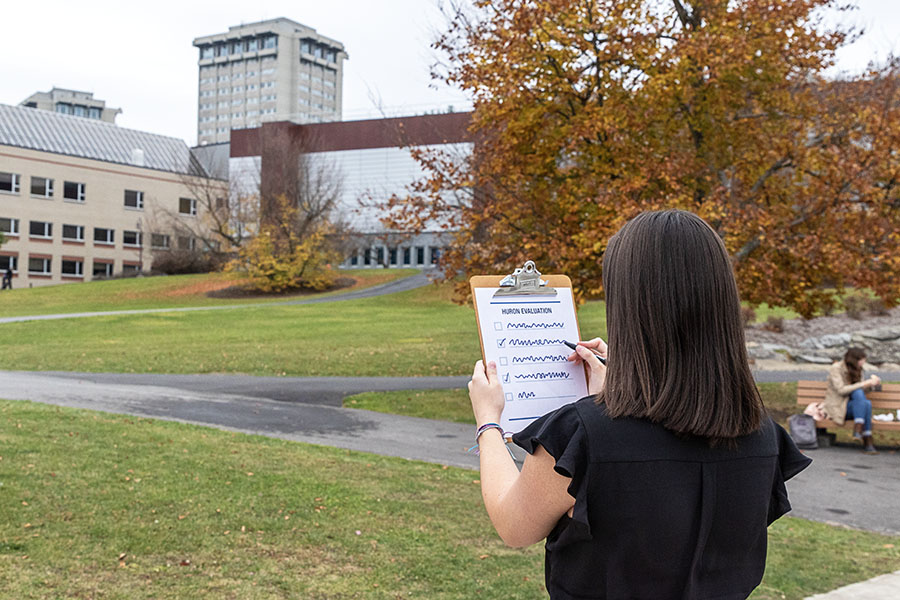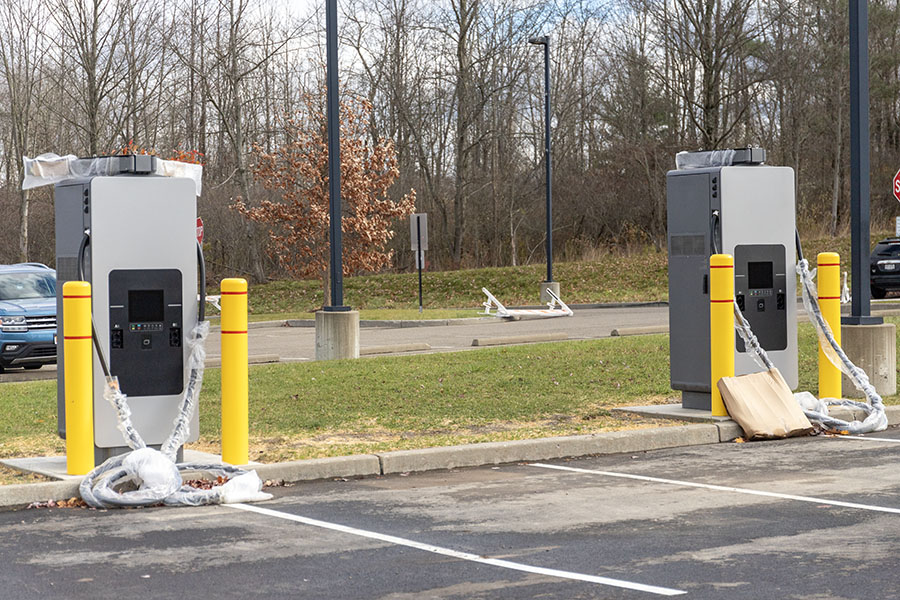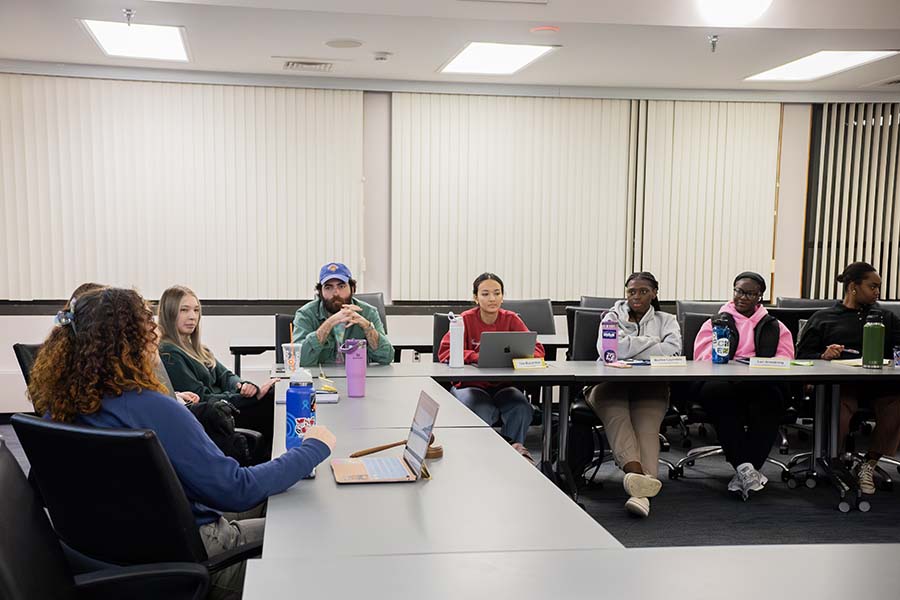The student who filed a lawsuit against Ithaca College and a former associate dean for sexual harassment and Title IX violations in November 2023 filed a memorandum of law Feb. 12 in opposition to the Defendants’ motions to dismiss the case.
The student, known as John Doe in the case, filed the memorandums of law in response to the Defendants’ — the college and Bryan Roberts, former associate dean of the Park School of Communications — motions to dismiss that were filed Jan. 22.
In the motions to dismiss, both Defendants were seeking to dismiss all or a majority of the claims in the original complaint, which included Doe’s claims against the college and Roberts for negligence; negligent hiring, retention, training, direction and supervision; negligent infliction of emotional distress; and intentional infliction of emotional distress. Both the college and Roberts filed motions to dismiss the Title IX claims.
In the Feb. 12 replies, Doe said all motions to dismiss the claims should be denied.
The memorandum of law filed against Roberts’ motion to dismiss Doe’s claims argues that Doe submitted “a well-pled complaint, demonstrated the plausibility of the fact alleged and has yet to collect discovery.”
Discovery is a stage of the trial where both the Plaintiff and the Defendant formally commence the process of exchanging information about evidence and witnesses they plan to present during the actual trial.
Doe also argues to deny all of the motions to dismiss from the college, stating that “Defendant Ithaca College repeatedly highlights the “implausibility” of Plaintiff’s allegations, including Bryan Roberts’ threats, as if they were not pled with the utmost specificity. In fact, Defendant Ithaca College is in possession of hundreds of pages of documentary discovery, including screenshots and testimony, yet still attempts to discredit the Plaintiff.”
In the reply to the college, Doe also argued that he is “entitled to review of the workplace sexual harassment training, policies and procedures if Defendant is going to claim that they were not negligent in their employment and training of Roberts and others.”
The defendants have until Feb. 20 to file replies to Doe’s responses to the motions.
Update, Feb. 15:
Ithaca College
Claims for Negligence; (1) Negligent Hiring, Retention, Training, Direction and Supervision; (2) Negligent Infliction of Emotional Distress; and (3) Intentional Infliction of Emotional Distress.
In response to Ithaca College’s motion to dismiss the claims about negligence, Doe argues that the plausibility of the claims “should not be, ‘measured with reference to what a particular attorney or judge deems to be subjectively reasonable behavior.’” The reply also argues that “A Plaintiff must, ‘give enough details about the subject-matter of the case to present a story that holds together,’ and here, he has done just that.”
Claims for Title IX violations
Doe argues that the college claims that Title IX absorbs all of his claims of negligence, “but fails to provide any legal support for this assertion.” The response includes examples of cases that included Title IX claims alongside negligence claims, like Totten v Benedictine University, Doe v Williamsport Area Sch. Dist. and G.D. v Kannapolis City Schs. Bd. of Educ.
Negligent Hiring, Retention, Training, Direction and Supervision Claim
In the college’s motion to dismiss the negligent hiring claims, it argued that the employer must have prior awareness of “‘the employee’s propensity for the conduct which caused the injury’ prior to the injury’s occurrence.’”
In response, Doe argues that if the standard was true, the claim would still pass. “Knowledge of the sexual abuse was imputed to the school as it was ongoing, being that the highest-ranking figure of Plaintiff’s individual school (the Park School) was the one directly engaging in the abuses,” the reply states.
Doe’s reply states that the court should not dismiss his claim for Negligent Hiring, Retention, Direction, Training and Supervision because “(1) notice has been properly pleaded, (2) Defendant Ithaca College failed to address why this cause of action should be dismissed as to the training and direction of Defendant’s staff, and (3) this motion is better left for Summary Judgement, once Plaintiff has been availed to his right to relevant discovery.”
A summary judgment is a judgment entered by one party against another party in court, but it is not a full trial.
Plaintiff’s Citation to the Superior Officer Doctrine
The reply argues that the college wrongly cited “Respondeat superior” — a legal doctrine according to which an employer was responsible for the acts of its employees — in its motion to dismiss.
Instead, the reply states that according to the “Corporate Complicity/Superior Officer Doctrine, Defendant is responsible for the acts of its employees if management and/or a superior officer has authorized, participated in, consented to or ratified the conduct in question,” adding that Roberts was a “Superior Officer” at the college.
Plaintiff’s Cause of Action for Negligent Infliction of Emotional Distress is neither duplicative nor meritless
The college’s motion to dismiss argues that Doe’s claim of Negligent Infliction of Emotional Distress is duplicative of his negligence claim.
Doe’s reply cites Farrell v United States Olympic & Paralympic Comm, stating that “this Court found Negligent Infliction of Emotional Distress and Prima Facie Negligence to not be duplicative with one another, explaining that a cause of action is not duplicative of another is the elements are different.”
The reply also argues that the actions required to prove general negligence are different from those needed to prove Negligent Infliction of Emotional Distress. The reply also stated that the college claimed Doe’s argument was meritless “due to an alleged lack of special relationship between Ithaca College and Plaintiff.”
The response cited Doe v. Union Coll. and Doe v Sarah Lawrence Coll., stating that the Doe V Sarah Lawerence case “reasoned, ‘Here, the plaintiff alleges sufficient facts to infer that once she reported the sexual assault and [defendant college] led her to believe that an investigation and prompt action would occur, the relationship between SLC and Plaintiff was no longer identical to Defendants’ relationship with all of its students.’”
Each Element of Plaintiff’s Cause of Action for Intentional Infliction of Emotional Distress is Properly Pled
The memorandum states that Doe did properly pled his claim for Intentional Infliction of Emotional Distress as “a plaintiff must prove: (1) extreme and outrageous conduct; (2) intent to cause, or disregard of a substantial probability of causing, severe emotional distress; (3) a causal connection between the conduct and injury; and (4) severe emotional distress.”
The reply argues that the college stated that intent to cause harm is a required element for such a claim, stating that the college “fails to note that a ‘disregard of a substantial probability of causing severe emotional distress’ can also meet the intent standard of element two.”
Bryan Roberts
Claims for negligence
Doe’s first legal argument in response to Robert’s dismissal claims was regarding the cause of action for negligence. Negligence is the failure of an individual to act reasonably, or act carelessly toward someone they owe a duty toward, according to Cornell Law School.
Against the allegations of negligence in the complaint, Roberts argued that he did not have any “duty” to protect Doe, so Doe’s complaint of negligence does not apply.
However, Doe argues that Roberts did have a duty “to exercise his power over Plaintiff wisely, and he did the exact opposite, manipulating and threatening Plaintiff into sex on numerous occasions.”
Superior Officer Claim
Robert’s motion to dismiss also argued that Doe did not plead sufficient facts to suggest that Roberts is a “Superior Officer” at the college, and if the Superior Officer rule does not apply, then Doe’s claims of negligence against him should be dismissed.
Doe now argues that Roberts, by virtue of being associate dean, was a Superior Officer, “whose authorization, affirmation, ratification and participation in the sexual abuse of Plaintiff renders him vicariously liable and responsible.”
Cause Of Action For Negligent Hiring, Retention, Training, Supervision and Direction.
The fourth point in Roberts’ motion argued that the employer in the case is Ithaca College, not Roberts. Roberts argued that Doe’s claims for negligent hiring, retention, training, supervision and direction do not apply to him.
In the memorandum of law, Doe argues that though Roberts said in his claims that he was not in an employee-employer relationship, he was in a “position of power” at the college. Doe argues that “Roberts sat on multiple search and hiring committees for the school, including the trans-Atlantic search committee. This directly conflicts with his assertion that he had no hiring power at Ithaca College.”
Doe also argues that with the case not being in the discovery yet — which is a stage of the trial where both the Plaintiff and the Defendant formally commence the process of exchanging information about evidence and witnesses they plan to present during the actual trial — it cannot be determined how much control Roberts actually had.
Claim for Negligent Infliction of Emotional Damage (NIED)
In his claim, Roberts had argued that Doe did not make a sufficient claim for negligent or intentional infliction of emotional distress.
The motion argued that Doe did not plead extreme or outrageous conduct and that Doe “has not pleaded unreasonable endangerment of his physical safety, or fear for his own safety,” so the claims for negligence against Roberts should be dismissed.
Doe in the memorandum claims that Roberts breached his duty by assaulting and inviting another employee to engage in group sex with him. The claim says “[Doe] was so traumatized by the months of abuse that he graduated in two and a half years and continues therapy to this day. Defendant Roberts, as a high powered, 40-year-old man, knew that his sexual escapades with a teenage student in his program would result in emotional harm.”
Cause of Action for Intentional Infliction of Emotional Distress (IIED)
In his claim, Roberts had argued that “extreme or outrageous conduct” was not sufficiently claimed for IIED.
Doe in the memorandum of laws said “[Roberts] alleges that pressuring a 19-year-old into sex, while threatening the student’s scholarship and future is not outrageous. That is absurd. A defendant has the right to deny all allegations, but when taken as true, they surely surpass the bounds of human decency.”
Duplicative NIED and IIED claims
Roberts had also argued that the NIED and IIED claims were duplicative of each other, but Doe argues that Doe’s case contains all the elements needed to issue NIED and IIED claims.
For information and resources on sexual harassment, individuals can call RAINN’s National Sexual Assault Hotline at 1-800-656-4673, access RAINN’s online chat or visit RAINN’s website for resources on sexual harassment.















